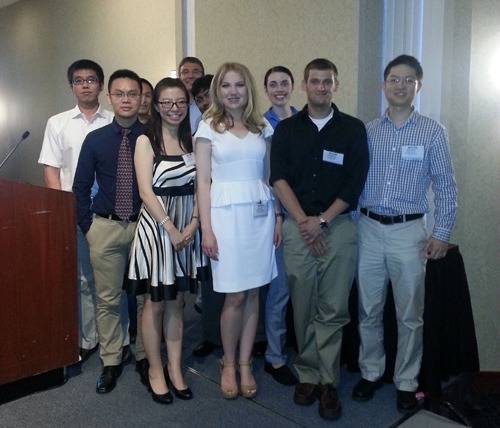Hailey Dunsworth, an Honors College student majoring in chemical engineering, presented her research at the annual meeting of the North American Membrane Society in June. Dunsworth was one of 10 students awarded an Elias Klein Travel Grant to attend the conference, and the only undergraduate.
Keith Murphy, president of the North American Membrane Society, explained that earning such an honor as an undergraduate is a great accomplishment. "By far the vast majority of applicants and winners of this award each year are graduate students. It is rare that an undergraduate student competes and even more rare for an undergraduate student to win this award," he said. "Hailey's presentation at the NAMS annual meeting, entitled 'Reduction of Electrical Resistance as a Key to Improving Power Generation Through Reverse Electrodialysis,' was well done and very well received."
At the conference, Dunsworth presented a poster about her research on reverse electrodialysis. Reverse electrodialysis uses the ionic difference between salt water and fresh water to create electricity. A reverse electrodialysis device consists of two or more chambers separated by membranes. The chambers alternate salt water and fresh water, and they are separated by alternating pairs of cation conductive membranes and anion conductive membranes.
The salt gradient, or difference in salt concentration, causes ions from the salt water to flow toward the fresh water, where the concentration is lower. The cation conductive membranes direct the positively charged sodium ion in the one direction while the anion conductive membranes allow the negatively charged chloride ions to flow in the opposite direction, and this movement of ions creates an electric charge. This movement of charge then creates power that can be collected. Dunsworth's research focuses on finding ways to allow this process to produce energy at rates that would make it economically feasible to implement reverse electrodialysis on a larger scale.
Dunsworth, who is working with Jamie Hestekin, associate professor of chemical engineering, is part of a Research Experience for Undergraduates program. The program, called EcoREU, is administered by the department of biological and agricultural engineering and supported by a grant from the National Science Foundation and the United States Department of Agriculture.
Topics
Contacts
Camilla Medders, Director of Communications
College of Engineering
479-575-5697,
